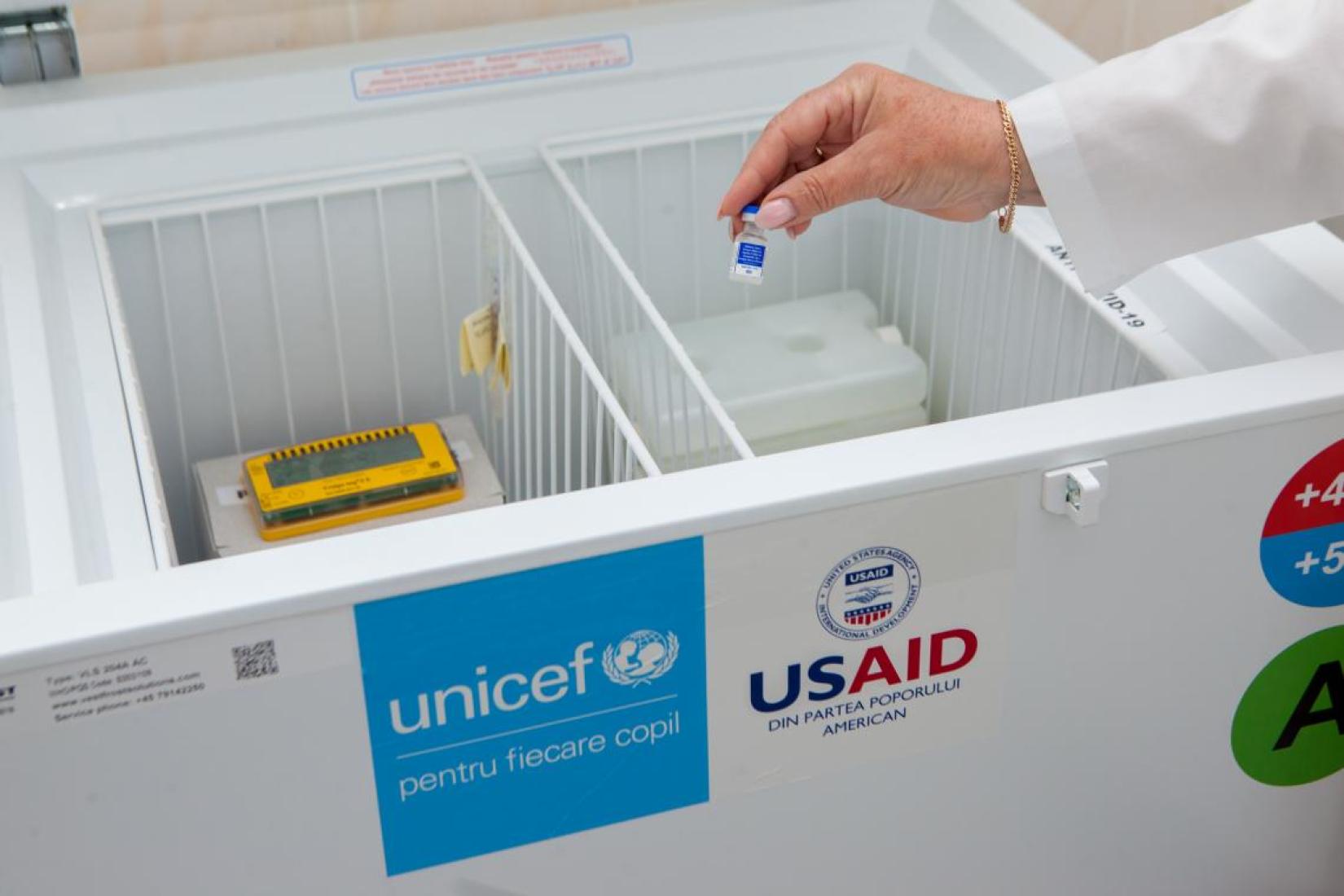Health centers from Strășeni district enjoy modern conditions for vaccine storage
13 July 2022
- UNICEF Moldova, with USAID support, distributed 284 refrigerators for vaccine storage nationwide

A year and a half after the launch of the vaccination campaign against COVID-19 in the Republic of Moldova, Viorica Ușurelu, a nurse at the Health Center in Strășeni, still remembers the challenges they went through to deal with the pandemic and vaccinate the population against the Sars-Cov-2 virus. The medical institution where she works did not have the required cold chain equipment to store certain COVID-19 vaccines, requiring a storing temperature of minus 24-25 degrees Celsius.
‘When we received the Moderna vaccine, we had to keep it at the Public Health Center of Strășeni, which had a refrigerator with a freezer. In order to give this vaccine to patients, we had to go there every time, thaw the vaccine, transport it to our facility and only then administer it. It was very complicated because vaccines require special storage conditions so that they don't lose their effectiveness and safety,’ says the nurse.
The COVID-19 pandemic and the advent of vaccines to prevent this infection, which require more specific conditions for their handling, ultra-low temperatures of minus 60 to 80 degrees Celsius, of minus 20 degrees Celsius, dictated the need to strengthen the capacities and performance of the cold chain infrastructure. Following a national cold chain infrastructure assessment, UNICEF Moldova, with the financial support of the United States Agency for International Development (USAID), purchased 284 refrigerators for storing vaccines, which were distributed to all health centers in the country, with PHCF Strășeni being one of the recipients of a freezer refrigerator for storing vaccines.
‘Currently, all the vaccines that are distributed to our institution's vaccination center are kept in this refrigerator, donated by UNICEF. It has made our work much easier. It also means that people who come for vaccination no longer have to wait,’ Viorica Ușurelu added.
‘It has made our work much easier. It also means that people who come for vaccination no longer have to wait’ Viorica Ușurelu
To ensure the safe storage of vaccines, UNICEF also distributed 500 Fridge-tag 2E temperature monitoring devices.
‘In the morning when we come to work, we record the temperature in the fridge and freezer with this device, then at the end of the day, we take it to the Public Health Center to find out the temperature at which the vaccines were kept over the course of the month. This device helps us to store the vaccines properly so that they don't lose their effectiveness,’ says the nurse Tatiana Sîrbu from the children's vaccination center.
17 km away from the town of Strășeni, there is the Family Doctor's Office of Rădeni, serving 1,200 inhabitants. The family doctor Petru Dodu, who looks after the health of commune’s residents, which also includes the neighbouring villages of Zamcioji and Greblești, says that prior to the pandemic, they only vaccinated children, and the equipment they had was sufficient for their work. With the start of the vaccination campaign against COVID-19, they required additional equipment to be provided, and the refrigerator donated by UNICEF ensures the required conditions for storing vaccines at the Vaccination Center from their locality.
‘It is a high-performance refrigerator that meets all relevant international standards, and I am glad that investment is being made in equipping medical institutions located in villages. Many of the refrigerators used by primary health care facilities were purchased more than 20 years ago and need to be replaced,’ says the doctor.
In order to fully ensure the cold chain from the central vaccine warehouse to the Public Health Centers, UNICEF has also purchased 1,800 cold boxes to transport vaccines, which have been distributed to all Public Health Centers in the country.
The total amount of the donation is USD 350,000. The donation is made under the ‘Prevention and Response to COVID-19’ Program, which is funded by the United States Agency for International Development (USAID) and implemented by UNICEF Moldova. The project is part of USD 3.9 million in assistance provided by the US Government through USAID to stop the spread of COVID-19 in Moldova.
It should be mentioned that Strășeni district has vaccinated 22,065 people against COVID-19. A total of 1,066,750 people have been vaccinated so far in the Republic of Moldova.



